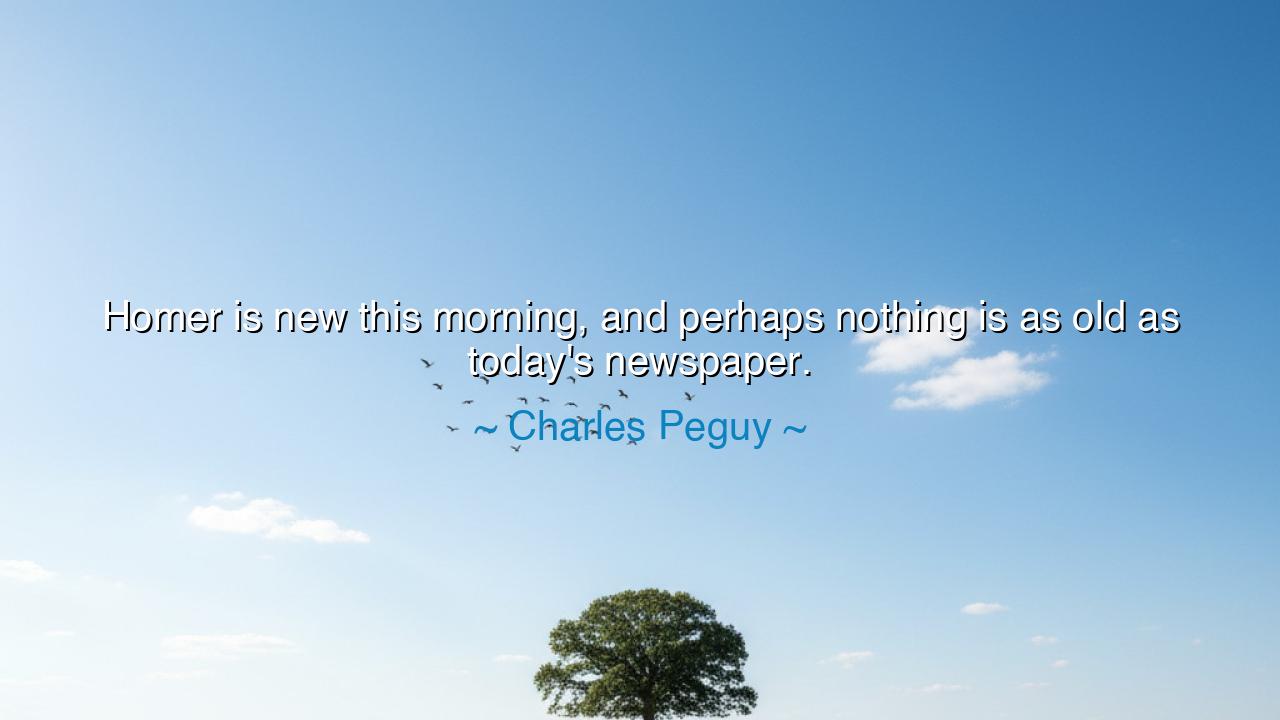
Homer is new this morning, and perhaps nothing is as old as






The words of Charles Péguy, poet and philosopher of the spirit, cut through time like a clarion: “Homer is new this morning, and perhaps nothing is as old as today’s newspaper.” In these words lies a paradox that reveals the enduring power of truth and the fleeting nature of fashion. What is ancient may remain ever fresh, while what seems current decays before the ink is dry.
He begins with Homer, the father of Western epic, whose voice has sung across nearly three millennia. Though his words were first uttered in an age of bronze and spear, they remain new each morning, for they speak of eternal themes: the wrath of Achilles, the wanderings of Odysseus, the longing for home, the weight of fate. These are not bound to the calendar; they touch the marrow of what it means to be human. Each dawn, when a reader opens the Iliad or the Odyssey, the words breathe again as though first spoken, because the truths within them never die.
In contrast, Péguy turns to the newspaper, that herald of the present moment. It speaks with urgency, trumpeting events, disputes, scandals, and the cries of the hour. Yet before the next sunrise, its words already begin to fade. By tomorrow, they are forgotten, and by next week, they are discarded. The newspaper, though it claims to bring “news,” ages with unnatural swiftness; its life is shorter than a flower’s bloom. What seems pressing in the moment becomes old before the day is done.
History confirms this lesson. Consider the ancient Dead Sea Scrolls, fragments written two thousand years ago, still carrying truths that stir the soul today. Compare them to the papers printed even fifty years ago: filled with names, crises, and quarrels now dust to us, irrelevant and silent. Who today clings to the headlines of 1873 or 1912? Yet who today does not recognize the power of Homer’s words, or the psalms of David, or the wisdom of Confucius? That which is rooted in the eternal stands firm; that which clings only to the hour crumbles swiftly.
This is not to despise the newspaper, for it has its role: to inform, to awaken, to call attention. But Péguy reminds us that truth is measured not by immediacy but by endurance. The greatest writings, the greatest songs, the greatest stories remain new because they speak to the soul’s unchanging needs: courage, love, justice, mortality, hope. The trivial quarrels of the day, no matter how loudly proclaimed, fade into silence if they lack such depth.
The lesson for us is this: seek what endures. Do not waste your life chasing only the headlines of the day, for they will wither before the sun sets. Instead, root your soul in the eternal—wisdom, art, scripture, philosophy, beauty—those things that remain fresh each morning, like Homer’s song. Let the transient pass as it must, but let the timeless nourish you.
Therefore, children of the future, remember this teaching: do not measure your life by the fleeting noise of the present moment. Seek out what will remain new when centuries have passed. Study the poets, the sages, the prophets, the dreamers, for their words are not bound by dust or time. And when you create, strive to write not the newspaper of the day, but the Homer of tomorrow—words and deeds that will remain alive when all else has grown old.
Thus, Péguy’s paradox stands as wisdom eternal: the ancient is new, the immediate is already old. The poet endures, the headline fades. Live, therefore, not for the shallow urgency of the hour, but for the immortal dawn that renews itself each morning.






AAdministratorAdministrator
Welcome, honored guests. Please leave a comment, we will respond soon